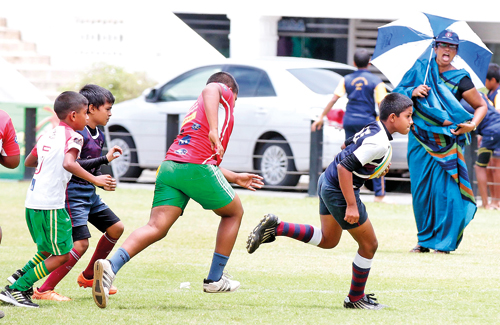Coaches and Child Psychology
View(s): Taking a peek at Good Sports Guide (GSG) for Coaches the 2018 of New Zealand Sports gives more than an insight into their expectations from coaches in sports. This project is about creating a quality sporting experience for children, to ultimately help children grow a lifelong love for sport. This is to introduce an adult who has a love for sport. Listening to commentaries during the Hong Kong (HK)-Sri Lanka (SL) game in Korea, the commentator was critical of a live post of possibly,`a local fan who queried the eligibility of HK players. The commentator went on to say that the players were HK Passport Holders.
Taking a peek at Good Sports Guide (GSG) for Coaches the 2018 of New Zealand Sports gives more than an insight into their expectations from coaches in sports. This project is about creating a quality sporting experience for children, to ultimately help children grow a lifelong love for sport. This is to introduce an adult who has a love for sport. Listening to commentaries during the Hong Kong (HK)-Sri Lanka (SL) game in Korea, the commentator was critical of a live post of possibly,`a local fan who queried the eligibility of HK players. The commentator went on to say that the players were HK Passport Holders.That is why the GSG to me is a good piece to read. Not that we need to ape the Kiwis, or for that matter, the western thinking. What we need is to use some aspects of the guide to take our sport forward and not start to invent the wheel. But it is about The Holistic Need for a Child in Sport. It is about a good spine of sport and in our focus it is about the spine for Rugby. It is about the inspiration, the connection, the empowerment, children being allowed to play games and the variety they experience.
Having said that, what is important for the development of Rugby is the understanding of why people coach, especially in Junior Rugby. One comment that stood out is that people coach because there is money in it. There are others who think that some imagine this will keep some retirees involved by giving them a source of income. Sometimes the aged and matured will be more valuable in Junior Rugby. But they need to follow a system which includes the philosophy of coaching.
Neither of the above seems to be a convincing reason to coach the young. What is important is to coach for the right reason. When it is about money that is in it, there is a lot of sideline coaching as well as bickering. This is not only in Rugby but also in Cricket and other sports. Listening to a coach shouting instructions from the boundary line will give an idea of what is happening. But if you keep shouting from the sidelines, children learn by observing others and, if the coach and other officials keep shouting and complaining, that is what they would learn. Ideally, coaches should always display a positive, encouraging demeanour, and be selective with interventions. What is important is the progress brought about through positive learning behaviors. This encourages a growth mindset.
 It is not the skills but the attitude that helps the game’s society through sport. Did the SL team in Korea have the attitude, despite having the skill? When they ran, they did really run and excite the crowd. That alone was not enough to sustain them to sit in the 3rd place they are used to sit on.
It is not the skills but the attitude that helps the game’s society through sport. Did the SL team in Korea have the attitude, despite having the skill? When they ran, they did really run and excite the crowd. That alone was not enough to sustain them to sit in the 3rd place they are used to sit on.
Getting back to the subject of coaching, one finds a mismatch of the number of players and coaches. The number of players on the World Rugby site cannot be related to the number of registered coaches. What it probably means is that there may be a number of them coaching without being exposed to a formal system and, or methodology.
Is the issue of coaches not being accredited a cause for a lack of attitude and, or game winning ability at international level. There is always a need for a method and a reason for madness. Madness here is the love of Rugby.
The behaviour matters in coaching in the life of a child. That is inculcated through daily action. The attitudes and behaviors of adults in children’s sports tend to cluster into two patterns of a Climate of Development and a Climate of Performance. This talk about the environment that surrounds a child and that is what contributes to the national game. There is a program by SLR to accredit coaches, while the school section is attempting to insist on the presence of certified coaches. This will obviously improve the game overall and those in administration of schools Rugby and the old boys involved too, need to follow a programme, so that they know what it is about. At least to know what to look for in selecting coaches.
Vimal Perera is a former Rugby Referee, Coach and an Accredited Referees’ Evaluator IRB


